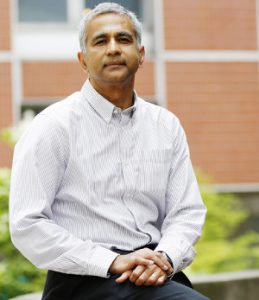September 16, 2016
Our first meeting will be on September 16, 11:30am – 1:30pm in the Komoda Room at the Heyman Center for the Humanities (moved to the Biomedical Engineering Conference Room on the 3rd floor of the Mudd building due to high turnout). We will be welcoming three speakers for a discussion of prosthetics and embodied cognition: Prof. Sunil Agrawal (Mechanical Engineering, director of the ROAR Lab), Dr. Heidi Hausse (Society of Fellows, History), and Dr. Lucie Vagnerova (Music Department). Lunch will be provided.
Reading:

Prof. Sunil Agrawal obtained a PhD degree in Mechanical Engineering from Stanford University in 1990 with emphasis on robotics, dynamics, and control. He currently directs the Robotics and Rehabilitation Laboratory (ROAR) and Robotic Systems Engineering Laboratory (ROSE), which have an active group of PhD, MS, UG, and post-doctoral researchers. Dr. Agrawal’s current and past research has focused on the design of intelligent machines using non-linear system theoretic principles, computational algorithms for planning and optimization, design of novel rehabilitation machines, and training algorithms for functional rehabilitation of neural impaired adults and children.
For his full bio and more about his projects, please visit his lab page: http://me.columbia.edu/sunil-agrawal
Dr. Heidi H ausse received her PhD in History from Princeton University in 2016. Her research uses the hands-on practices of surgeons and artisans to explore life in early modern Europe, with a particular interest in the intersections of culture, medicine, and technology. Her book project, Cutting, Coping, Curing: Surgical Dismemberment in the Holy Roman Empire, 1500-1700, examines surgical treatises and artifacts of prostheses to uncover a transformation in the way in which early moderns cut apart the body and worked to artificially put it back together. Her research has been supported by the American Council of Learned Societies, the Consortium for History of Science, Technology and Medicine, and the Dr. Günther Findel-Stiftung Foundation. Dr. Hausse is the 2016-2017 Molina Fellow in the History of Medicine & Allied Sciences at the Huntington. She has articles published or forthcoming in The Journal of Early Modern History and The Sixteenth Century Journal.
ausse received her PhD in History from Princeton University in 2016. Her research uses the hands-on practices of surgeons and artisans to explore life in early modern Europe, with a particular interest in the intersections of culture, medicine, and technology. Her book project, Cutting, Coping, Curing: Surgical Dismemberment in the Holy Roman Empire, 1500-1700, examines surgical treatises and artifacts of prostheses to uncover a transformation in the way in which early moderns cut apart the body and worked to artificially put it back together. Her research has been supported by the American Council of Learned Societies, the Consortium for History of Science, Technology and Medicine, and the Dr. Günther Findel-Stiftung Foundation. Dr. Hausse is the 2016-2017 Molina Fellow in the History of Medicine & Allied Sciences at the Huntington. She has articles published or forthcoming in The Journal of Early Modern History and The Sixteenth Century Journal.
Dr . Lucie Vagnerova holds a PhD in Historical Musicology. Her dissertation “Sirens/Cyborgs: Sound Technologies and the Musical Body” (2016) explores the role of the body in electroacoustic music. Her interests include the work of women composers of electronic music, sound art, new media, and issues of gender, race, and labor in experimental and popular music. She has taught “Masterpieces of Western Music” and “Critical Approaches to Music Technologies” at the Department of Music, and “Sexing Sound Art” at the Institute for Research on Women, Gender, and Sexuality at Columbia. She serves on the editorial board of Current Musicology and is the Assistant Editor of Women and Music: A Journal of Gender and Culture.
. Lucie Vagnerova holds a PhD in Historical Musicology. Her dissertation “Sirens/Cyborgs: Sound Technologies and the Musical Body” (2016) explores the role of the body in electroacoustic music. Her interests include the work of women composers of electronic music, sound art, new media, and issues of gender, race, and labor in experimental and popular music. She has taught “Masterpieces of Western Music” and “Critical Approaches to Music Technologies” at the Department of Music, and “Sexing Sound Art” at the Institute for Research on Women, Gender, and Sexuality at Columbia. She serves on the editorial board of Current Musicology and is the Assistant Editor of Women and Music: A Journal of Gender and Culture.